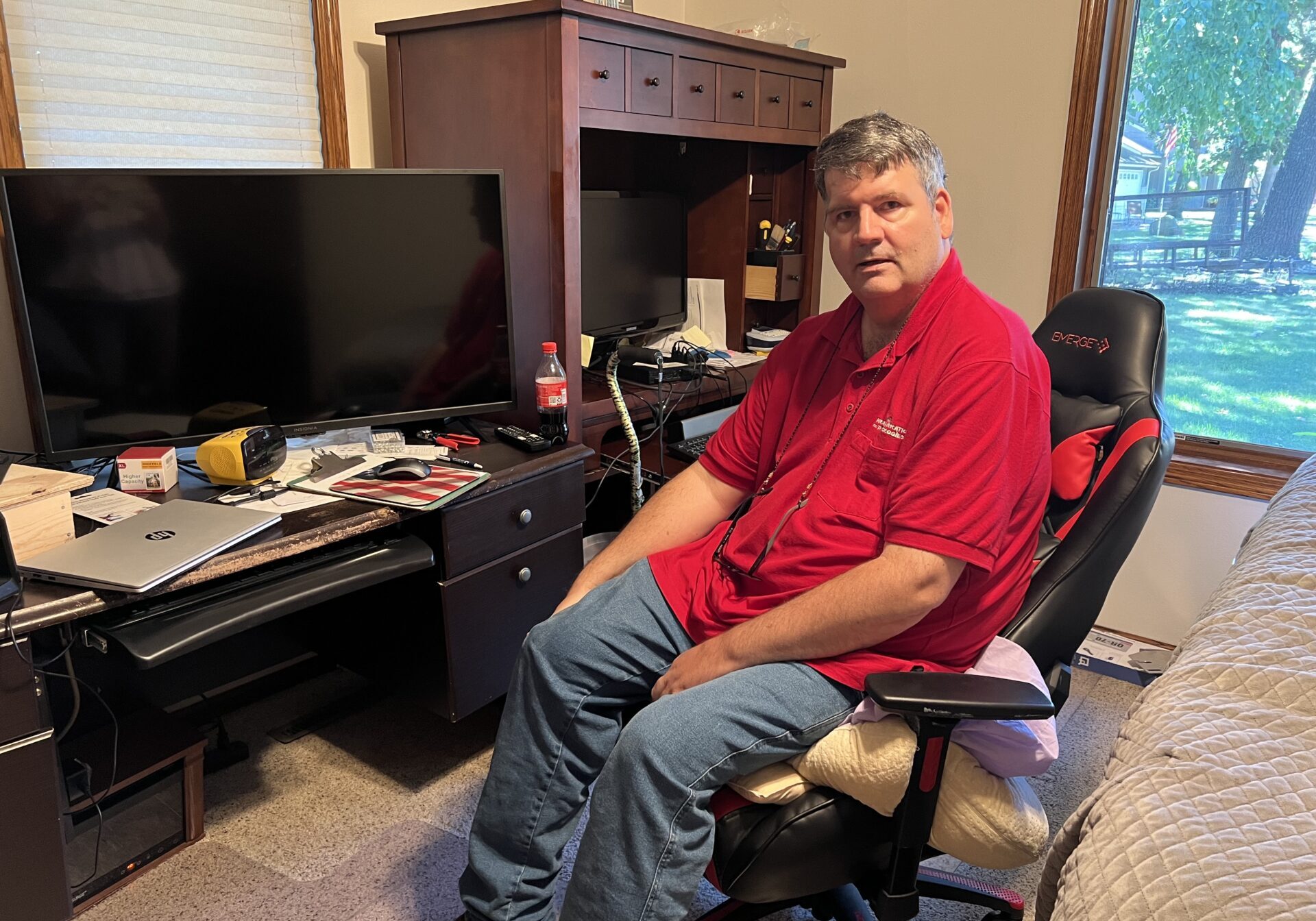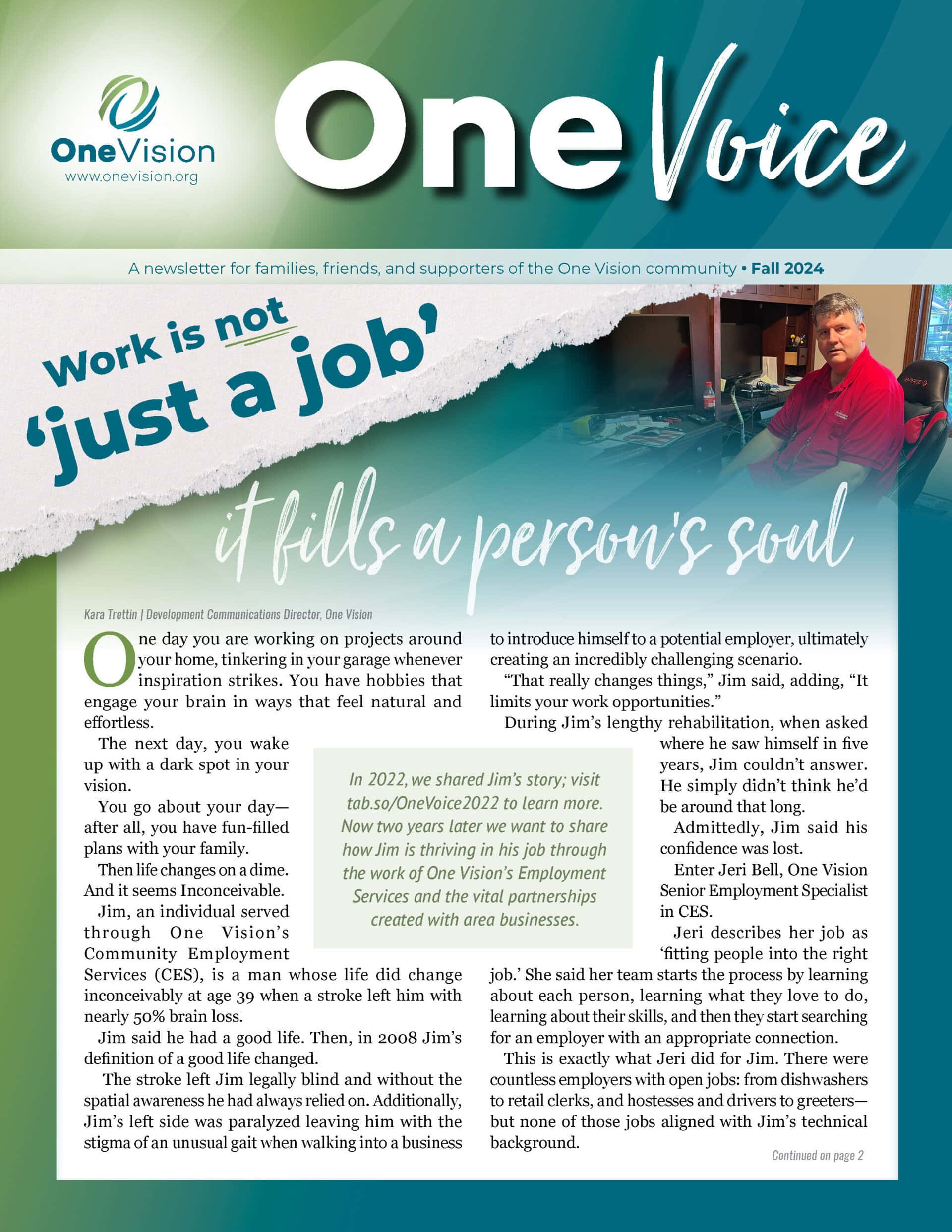Work is not “just a job”—it fills a person’s soul
From One Voice: Fall 2024
By Kara Trettin | Development Communications Director, One Vision
One day you are working on projects around your home, tinkering in your garage whenever inspiration strikes. You have hobbies that engage your brain in ways that feel natural and effortless.
The next day, you wake up with a dark spot in your vision.
You go about your day—after all, you have fun-filled plans with your family.
Then life changes on a dime. And it seems Inconceivable.
Jim, an individual served through One Vision’s Community Employment Services (CES), is a man whose life did change inconceivably at age 39 when a stroke left him with nearly 50% brain loss.
Jim said he had a good life. Then, in 2008 Jim’s definition of a good life changed.
The stroke left Jim legally blind and without the spatial awareness he had always relied on. Additionally, Jim’s left side was paralyzed leaving him with the stigma of an unusual gait when walking into a business to introduce himself to a potential employer, ultimately creating an incredibly challenging scenario.
“That really changes things,” Jim said, adding, “It limits your work opportunities.”
During Jim’s lengthy rehabilitation, when asked where he saw himself in five years, Jim couldn’t answer. He simply didn’t think he’d be around that long.
Admittedly, Jim said his confidence was lost.
Enter Jeri Bell, One Vision Senior Employment Specialist in CES.
Jeri describes her job as ‘fitting people into the right job.’ She said her team starts the process by learning about each person, learning what they love to do, learning about their skills, and then they start searching for an employer with an appropriate connection.
This is exactly what Jeri did for Jim. There were countless employers with open jobs: from dishwashers to retail clerks, and hostesses and drivers to greeters—but none of those jobs aligned with Jim’s technical background.
Jeri immediately thought to talk to Next Generation Technologies (NGT) CEO, Brian Blodgett. Brian said Jeri was not initially looking to employ Jim with NGT; however, she was seeking advice from him about employers who might be a good fit with Jim’s technical skills.
“I’m in Mason City this week. I can just meet you there [at Jim’s house,]” Brian said, “When I met Jim, it was obvious he had some skills, was a good person, and met NGT’s values. These are all important characteristics in hiring the right candidate.”
NGT’s auditing department lacked redundancies in its workflow and yet, they did not need a full-time employee to complete the necessary processes; and Jim needed a part-time job that allowed him to feel purpose again.
The skills Jim maintained and relearned during his rehabilitation ultimately made him an ideal fit for a carved-out Auditor role with the North Iowa full-service technology company.
The next step was a trial employment period for Jim. Jeri assisted with the employment structure and Brian’s team simply had to consider the coordination of how Jim can do the job successfully taking into his unique challenges into account; such as a proper desk setup, larger monitors, communication needs, and a work from home setup.
“We had a need, and Jim’s skills were able to fill that need,” Brian said, “This is part of NGT’s value structure, so therefore it was easy for my team to try for a win/win.”
“Jim was not hired at NGT because of his disability. Jim was not hired at NGT despite his disability. He was hired because he met a need we had. All it required was to think a little differently about how the job could be done,” Brian said.
Four years later, Jim said he likes the work he is doing and hopes to keep doing his job for years to come. He continues to work 20 hours each week and expresses pride in the work he accomplishes with his team.
Jim also expressed his adamant belief to others who may be in similar scenarios where life changes on a dime, saying, “If there is anything you can do to get employed, follow it.”
Echoing Jim’s statement and adding emphasis to how important a job is to individuals with disabilities, Jeri said, “It’s not just a job, it’s belonging to something bigger than yourself—Let’s make their job fill their soul.”


